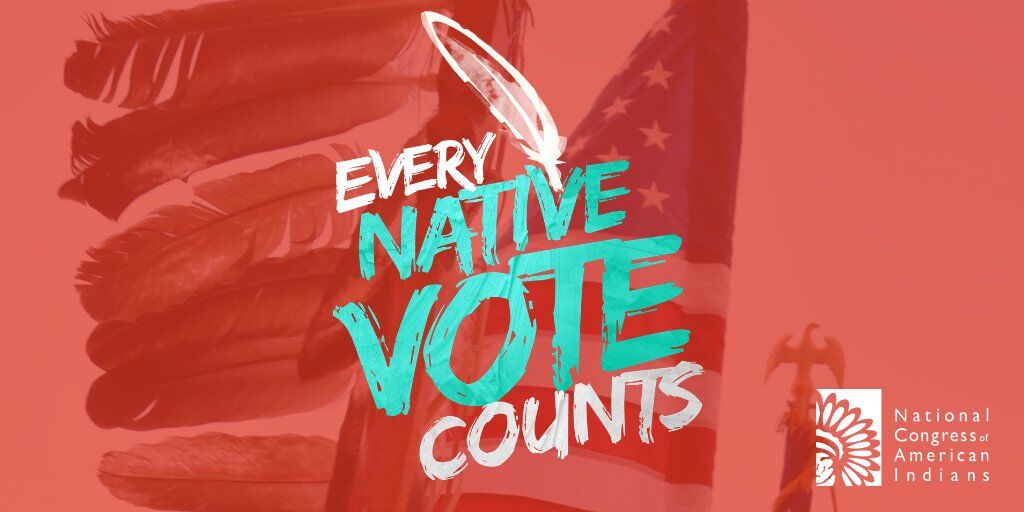How Voting Matters for Native Peoples
Voting matters if we want to have Native sovereignty and cultures and knowledge upheld, preserved, and respected.
Voting matters if Native people want to be seen and heard.
I recognize that Native peoples fall all along the political spectrum. But no matter what our political beliefs are, the way to be heard and effect change is to vote.
When the Supreme Court found that North Dakota’s requirement of a physical address to vote was lawful, Natives across the country knew this would disproportionately disenfranchise Native people, because the post offices in our communities and not home addresses serve as the physical address for mail delivery, utility, and emergency services that are usually limited on Indian reservations. Natives will continue to be invisible and marginalized.
When women, who are always at risk, shared their stories of harassment, I heard and believed them. Yet they were disrespected and ignored by elected officials after sharing their stories of violence and harassment.
When our government locks up immigrants who come to America borne by hope for better lives and tears their children from them, the memories and experiences of broken Native families come into the light once again.
When the government dismantles the safety net that supports our most vulnerable being dismantled, it makes our country itself more vulnerable.
Many people across the country have expressed despair and anger because of what is happening in our courts, our legislature, and through executive order.
But there is no need for despair or anger. They do not serve anyone well. What will serve us well is to vote. Voting matters.
Voting matters because it is a powerful tool for transformation and action. We can all use that platform to share our concerns and make our voices heard. And we should all help eligible voters in our communities to do the same.
Voting matters because legislators make decisions that impact our daily lives. They decide matters of public policy. They appoint boards. They vote on legislation that controls national, state, and local resources for education and natural resources. Most importantly, they allocate budget monies to their constituents’ priorities.
If we want resources for education, we must elect representatives who view education as a necessity for a strong nation, strong communities, and strong families. If we want more resources for housing, water, health care, and energy, we must elect people who will represent our views. Legislators decide how much tax to impose and create final budgets that are signed by executive leadership.
Voting matters because the right to vote is fundamental to democracy. It gives the people a voice in how the nation, states, and communities are run. When tribally-controlled education came into being in 1968, the United States was enmeshed in the Civil Rights Movement and voting rights. The Indian Citizenship Act of 1924 and the Voting Rights Act of 1965 laid the foundation for our right to vote. It is our responsibility to exercise that right.
Voting for state legislators who pledge to support laws creating and protect voting access and support voting rights is critical. Electing national leaders who will appoint judges who safeguard voting access is just as important. And for people who live in states where judges and justices are elected, voting is a way to directly select who serves on the bench.
The right to identity and family is inherent in the human experience and is particularly valued by tribal people. We view identity as essential to well-being and relationships as our strength. The ruling in the Texas federal district court that recently stated that sections of the National Indian Child Welfare Act (NICWA) are unconstitutional is the perfect example of why voting matters. Legislators make laws like NICWA and appoint the judges whose rulings can support or diminish our sovereignty. In this recent case, the holding of the case violates Native peoples’ inherent right to socialize our children within our families and communities.
So as you can see, voting does make a difference.
We all must remember our responsibilities. Natives must act with our voices and with our votes. Together we must support and encourage others to vote, especially Native peoples.
Our voices matter.
Our stories matter.
Our identity matters.
Voting is one way to be heard, preserving our stories, our cultures, our lands, and our way of life.
- Register to vote. Vote early. Vote by mail. Vote in person. Vote in whatever works for you. Just vote. Make your voices heard.
- If you are in North Dakota, your tribal office may be issuing updated IDs. Please call your tribal office if you need advice. Here is a link to an article about the Standing Rock tribe of North Dakota issuing free tribal IDs until November 6, 2018: https://nativenewsonline.net/currents/with-attempt-to-suppress-native-vote-standing-rock-sioux-tribe-issuing-new-tribal-ids/?platform=hootsuite
- Here is a link to how to register to vote in your state: https://www.rockthevote.org/register-to-vote/
- Here is a link to Mark Trahant’s coverage of Native candidates who are running for election in 2018: www.trahantreports.com
- Here is a link to the article “Why It’s So Hard to Vote in Arizona’s Indian Country”

